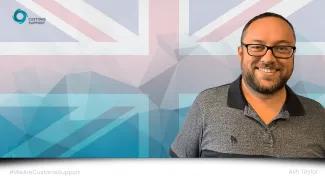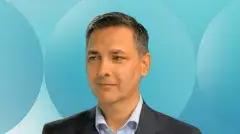Who are you?
I'm Ash Taylor. I've been living in Felixstowe all my life. I have one daughter, who is five years old. When I finished school in 2001, I went straight into work with a freight forwarding company located within Felixstowe port.
I originally started completing customs declarations, and just gradually moved into an IT role. I've always been interested in IT at a very early age and playing with computers, whether it be games or doing a little bit of programming here and there. It feels like my whole life I’ve had a computer attached to my hip.
When I started at UKCS [acquired by Customs Support in 2021], I had been completing customs declarations for over 20 years. I’ve grown into the IT director role from there, leading UKCS’ IT for six years before they were acquired, and now manage the IT for Customs Support in Felixstowe.
What does an IT director do?
I am responsible for managing the day-to-day IT-related activities and projects, ensuring that everyone can do what they need to do in a timely manner, and developing the software and integrations that we use with other Customs Support offices. I also manage new and existing supplier contracts.
What does your typical working day look like?
Every morning begins with getting the necessities out of the way, and that is making myself a cup of English tea. I then catch up with the team and make sure all systems are operational, and ensure no ongoing issues are present. Usually, it’s obvious if we have an issue with the system, because we’ll have five, ten, or maybe even more tickets raised within our internal ticketing system. If tickets have been created, I need to understand what those issues are, and what impact that is having on the business. Every issue is ticketed and given priority so that we can fix the urgent problems first.
After the tickets are dealt with, I will check my calendar to see what meetings I have for that day. Then, I will continue working on whatever project we have at the moment. Recently, a lot has been CDS related, but we are also continuing to develop and test new and existing interfaces for our EDI system, and I am also training our other IT technicians on how to work with these systems.
What kind of issue is top-urgent?
Recently, urgent issues are coming from the CDS integrations. It is a significant change for our systems, HMRC, and the intermediaries we use to communicate between the two. Because it isn’t necessarily a problem on our side, we need to double-check everything before we go to the other party to ask them to diagnose their system. With imports closing for CHIEF at the end of the month, ensuring we are CDS-ready across our entire client base has been a key focus for us here.
CDS is going to be mandatory from October, how have you prepared for it?
We are ready for CDS. The problem is that some traders have had issues with registration, and CDS also has teething problems, as you can expect from such a radical change to a customs processing system.
From our side, we’ve needed to rewrite our integrations and account for how data needs to be presented and captured from CDS, but we have also been running CHIEF declarations alongside so that we can continue to keep goods moving whilst we diagnose CDS issues. The mix of processes and constant changes mean we have needed to refine the process to keep our data clean.
What do you like the most about your job?
I like learning the new technologies that are coming on board at the moment. We're seeing a lot of new technology coming from Customs Support central. The way we are working with integration, automation, and digitalising everything, it’s exciting.
Tell us a little about the technology you’re pioneering
So we’ve been developing interfaces for our EDI system for a while, but we are now communicating with various other platforms and APIs so that we can do more with it. We don’t only translate documents, we also feed that data into other systems and output them into multiple formats on the other end.
With the way in which we can map data now and the vision we have for what we want to do with it, there’s a lot of progress happening, particularly with end-to-end clearance automation. Having the opportunity to coordinate our testing with colleagues across Europe, means that we can really focus on it from all angles as a united entity, whereas I don’t think you would have that if it wasn’t all in-house.
You went from declarant to IT director. Do you think that there are good opportunities for people who want to work outside of the declarant skill set within the industry, and for people who are just leaving school?
Yes, definitely. Customs, as an industry, is not only about declarations. There are finance people, consultants, marketers and salespeople, IT technicians, and more.
I think that most people who look at the industry see the declarants first because that’s what we are here to do, but there are opportunities for all kinds of minds. Particularly within a company like ours [Customs Support], where there are so many roles across all of our offices.
The possibility to change roles and travel is there, and I know we pride ourselves on people development all the way through the organisation. Take our declarants, for example. We don’t just teach people what to put in boxes but help them understand why they do and where the information comes from so that they have the knowledge behind what they do.
If we have an apprentice out of school, or another entry-level employee, then we want them to do more than fill boxes if they move on to other places.
What do you do when you're not at work and how does your outside life influence your work skills?
I like to relax outside of work and spend time with my daughter. There was a time when I was doing a lot of work outside of work. I think being in IT, and having an interest in it, that kind of just happens. You fall into the trap, and I needed to get out of that habit. So now I relax, don’t worry about things, and enjoy spending time with my daughter, taking her out and being there with her.
What's the most important thing a client should look for in a customer's broker?
I would say accuracy more than anything. Accuracy, Compliance, we've always prided ourselves around compliance. It’s a big thing for a client to know that their declarations are being completed correctly. Otherwise, regular check-ins with clients to make sure they are happy, see if there is anything that we could do to make their process easier, and make sure we go the extra mile so that they feel like more than “just a client”.
You now work with a Europe-wide network. If you were to visit an office location of custom support, where would you go and why?
Most of my communication comes from the head office in the Netherlands. It would be nice to visit there sometime and meet them all in person.














